Extracting Aleppo from the Propaganda
The mainstream U.S. news has supplied a consistent narrative regarding Syria that treats the “rebels” as the good guys and the “regime forces” as the bad guys, but it has never been that clear-cut, as Dennis J Bernstein reports.
It’s rare for Americans to hear any version of the Syrian conflict other than the simplistic accounts favored by the U.S. government and the mainstream news media that rely heavily on rebel sources and their international supporters who often traffic in propaganda.
One of the few independent Western journalists covering the horrific conflict is Eva Bartlett who has traveled to Syria six times in the last two years and just returned from a six-month stint in the war-torn country where she investigated human rights violations and terrorism against Syrians.
Her multiple investigations have led the seasoned Canadian journalist and human rights activist to conclusions that contradict what the Western media and governments have been reporting non-stop, regarding human rights violations by all sides.
I spoke with Bartlett last Thursday during her West Coast speaking tour about her discoveries, the situation in Aleppo, and the impact the war has had on large numbers of Palestinians who live in exile in Syria.
Dennis Bernstein: Eva, tell us, when were you last in Aleppo?
Eva Bartlett: I was in Aleppo twice in November, for my third and fourth visits to Aleppo.
DB: Okay, and describe the situation there on the ground. What’s happening, what’s… daily life like?
EB: I’m going to describe what it was like then, and note that, as of the last week, things have change dramatically. When I was there, in prior visits, as well, July and August and in November, the situation was that, on a daily basis, terrorists that are in many ways backed by the West and Gulf nations, financially and otherwise, were, on a daily basis, firing a variety of bombs on the civilian areas of Aleppo, which we never hear about in the corporate media.
In these areas there are over 1.5 million people. And on a daily basis they were subject to bombings of grad missiles, explosive bullets, mortars, gas canister bombs, water heater bombs, which are basically improvised bombs using gas canisters and water heaters, stuffed with explosives and shrapnel.
When I was there, I experienced some of that myself, with a bomb going off half a kilometer away, and with an explosive bullet landing about fifteen meters away. I also met with many people who had lost loved ones due to these bombings. I went to hospitals that themselves had been hit, like the al-Dabit Maternity Hospital.
In May of this year the al-Dabit Maternity Hospital was destroyed internally by a terrorist’s fired rocket. And when it was destroyed, three women inside were killed, and many more were injured. This was not, to my knowledge, reported in the corporate media, although the media’s always talking about alleged strikes on hospitals in Aleppo.
DB: Now… so we keep it clear, and untangled, when you say terrorists, are you talking about the people that the United States is supporting?
EB: Yes, I am. The United States will say, at least, that Jabhat al-Nusra–which is Al Qaeda in Syria, and which tried to rebrand itself as Fatah al-Sham, but which is still Al Qaeda in Syria–the U.S. will say that they are terrorists.
EB: Yes, I am. The United States will say, at least, that Jabhat al-Nusra–which is Al Qaeda in Syria, and which tried to rebrand itself as Fatah al-Sham, but which is still Al Qaeda in Syria–the U.S. will say that they are terrorists.
But the United States will not say, for example, that Ahrar al-Sham are terrorists, although on their internal documents when they discuss funding, they do acknowledge that they are terrorists. But, publicly they don’t state that.
They also don’t state that Nour al-Din al-Zenki are terrorists, even though this particular group savagely and methodically beheaded a 12 year old Palestinian boy, Abdullah Issa, some months ago.
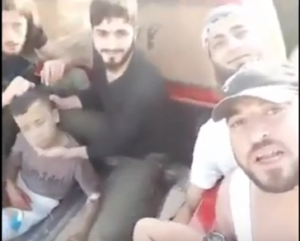
U.S.-backed Syrian “moderate” rebels smile as they prepare to behead a 12-year-old boy (left), whose severed head is held aloft triumphantly in a later part of the video. [Screenshot from the YouTube video]
DB: Alright, you mentioned… a bunch of things we’re hearing here. Let’s just go over a few of them. You talked about the situation of the child, the Palestinian child who was beheaded. And you’re saying that he was beheaded by forces supported by the West?
EB: Yes.
DB: And how does the West support this particular force?
EB: They deem Nour al-Din al-Zenki a moderate group. I’m not aware if there’s financial support, there’s certainly support in terms of whitewashing their crimes. And when the cease fires are enacted, for example, in September and in February, these groups were not expected to participate in the cease fires. Only al-Nusra and ISIS and other al Qaeda affiliated groups were expected to participate.
But the problem with this is the U.S. themselves cannot control the terrorists that they support as moderates, who intermingle with the terrorists that they designate as terrorists. So they’re very aware of the crimes that these different groups they deem as moderates are committing, yet, they cannot control them.
DB: Alright, let me ask you a broad question, this way. You certainly do not get this story in watching the U.S. corporate media. So, let me ask you… what’s missing, from the U.S. corporate media’s picture? I mean you’ve been describing some atrocities that we haven’t heard about, but in the broader picture what’s missing?
EB: The Syrian voice. […] The corporate media interviews people that might be representatives of Syria, living abroad who haven’t been to Syria for years, or people they claim are in eastern Aleppo, until recently (now eastern Aleppo is liberated).
But they don’t [talk to civilians on the streets]… I mean how many western journalists have gone to Aleppo? And, you can. I’ve applied for visas and I’ve waited well over a month for my journalist visa. It’s not impossible, and other western journalists have gone to Syria and gone to Aleppo.
But they largely do not bother to talk to the Syrian people there, and ask how has life been for you these past years in Aleppo? If they had, they would find out that people have fled from eastern Aleppo. Something like 600,000 people over the years have fled from eastern areas of Aleppo which the terrorists’ factions occupied, to government-secured greater Aleppo. They did so for their own safety and they were given shelter by the government in university housing and in other shelters.
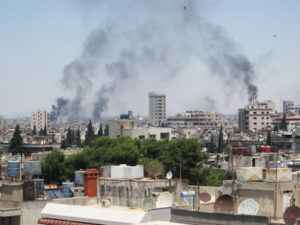
Smoke billows skyward as homes and buildings are shelled in the city of Homs, Syria. June 9, 2012. (UN Photo)
But this is never talked about in the corporate media. They would never talk about the fact that water and electricity have been cut off, since the terrorists took over these areas, of eastern and outskirts of Aleppo. They wouldn’t talk about the bombings that I’ve mentioned. They wouldn’t talk about the period of prolonged sieges, when terrorist factions cut off the only road that was leading into Aleppo. And these prolonged sieges meant that people weren’t getting food and medicine, etc. from outside.
DB: […] Is there a web site that people can go and find out [more about your lecture series]?
EB: Yeah. The tour is largely organized by a coalition of anti-war, anti-imperialist groups. The handsoffsyriacoalition.net is the website.
[…]
DB: Now … you probably heard that we just had a presidential election, here. And there’s a big struggle… everybody, you know, is pretty clear that Trump is a white supremacist and serial liar, but when you consider what Trump has been saying and what Clinton was saying about Syria policy, Trump was making more sense.
In terms of the two candidates, you had to feel for what Trump was saying because Clinton wanted to draw down the same policy that gave us Libya, and a policy that puts the US head to head with Russia, and now China. And that could lead to WWIII. Your impressions and your thoughts on that?
ED: I mean, I’m up front in saying I don’t follow U.S. politics that closely for a variety of reasons. I believe that the U.S. and the military industrial complex obviously profits out of bringing wars upon these countries that it declares, we declare (we, the West declare) we’re going into these countries for human rights and democracy.
So I can’t really address a whole lot to do with Trump and Clinton, but on the note of human rights and on the note of rights of women, these so-called moderates that the West supports and that the corporate media whitewashes, look at how they treat women in Aleppo. I met with displaced people from eastern Aleppo, people that had fled years prior, and people who had fled weeks prior, when I met them. And they spoke of how women had to be covered head to toe, including their hands. Women had no rights in Aleppo. And people in general, were being starved.
And these are things that are coming out now that Aleppo is liberated, the testimonies of people on the ground, meeting these people that were evacuated and saved from the eastern areas of Aleppo, are horrific. And, you know, all the corporate media has been accusing the Syrian government of starving… what the U.N. said was 250,000 people in eastern Aleppo. Now there’s only a small pocket, I think the measurements were something like two-square miles, in Aleppo, now that still have some militants.
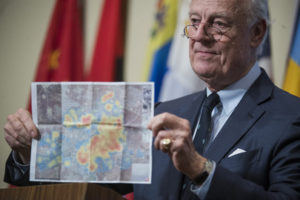
Staffan de Mistura, United Nations Special Envoy for Syria, holds up a photo of Aleppo while briefing journalists following a Security Council emergency meeting on the situation in Syria, on Dec. 13, 2016. United Nations, New York (UN Photo)
Are we expected to believe that since roughly 100,000 people have come out of the areas occupied, until recently, that the remaining two-squared kilometers are holding 150,000 people? Because the U.N. has said for years, and even [on December 15, 2016], [Staffan] de Mistura, the representative of the U.N., the peacekeeper, said there’s 50,000 in that small pocket. I mean how credible is this? Are they standing on one another’s head and shoulders?
This is an important point, because these numbers were inflated. And they’ve been inflated throughout the conflict on Syria–the war on Syria–in order to make people feel that they have to do something, and usually that something is supporting a no-fly zone. Which, like Libya, will just bring so much “human rights and democracy”.
The other point I wanted to make is that, you know, in terms of all the myths we’ve heard about Syria, over the years, the Syrian government has been accused of so many things, chemical weapons, they’ve been accused of massacring civilians. And every time there has been an investigation, all fingers have pointed to the rebels. Even Carla Del Ponte, who’s of the U.N. investigative team in a 2013 chemical attacks accusations, said, “No, it was the terrorists that had”… she said rebels… but they had “sarin.”
So … you asked earlier what are we not hearing from the corporate media. I’ll tell you what we’re not hearing, now, from the corporate media: The scenes, the voices of the people who have been liberated, saying “Thank you” to the army.
The army, by the way are not Assad’s forces. The army, the Syrian army is actually made up of Syrian people. And it’s not simply Alawite. It’s Sunni, it’s Alawite, it’s Christian. And the people in Aleppo… if people bother to search out independence, on the ground, Syrian journalists, or if you want, Russia Today, you will find footage of people praising the army. And people who have been terrorized for years by these terrorists that the West calls “moderates”.
DB: … We know there are major Palestinian refugee camps in Syria. The Palestinians haven’t done very well as a result of U.S. supported so-called… whatever you want to call them, the opposition to the government there. We know that thousands have come over the border, and have become refugees one time over again in crowded refugee camps. Can you talk about that?
EB: I mean, I don’t know about the number about thousands of Palestinians. It’s quite possible. But what I do know is that, first of all, prior to this war on Syria, Palestinians in Syria had the best existence of any area where they lived outside of occupied Palestine. You cannot compare their existence in Syria to say that of in Jordan or Lebanon, where they have no rights, whatsoever. In Syria they held equal rights, as Syrian citizens including free health care, free education, etc. And they were treated as Syrians, respected. And I spent a lot of time in Lebanon. And they are not respected there.
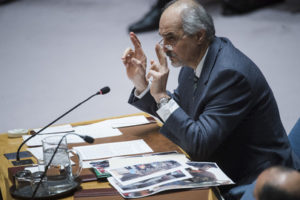
Bashar Ja’afari, Permanent Representative of the Syrian Arab Republic to the UN, addresses the Security Council emergency meeting on the situation in the Syrian city of Aleppo. 13 December 2016. (UN Photo)
The second point is that there are Palestinians who have fought against the state, including Hamas. And there are Palestinians who have fought alongside the Syrian army, including groups like Liwa al-Quds, who are instrumental in liberating areas of Aleppo. I visited the University of Aleppo residences which, 16 of 20, are housing IDPs [internally displaced persons] from other areas of Aleppo. And one of the buildings was dedicated to Palestinians from Handarat camp. So, I mean, that’s one thing.
I would highly recommend people read a very detailed and thoroughly researched article by Sharmine Narwani called “Who dragged Palestinians into the Syria conflict?” She visited, I wasn’t able to [simply because I didn’t have time], but she visited… many Palestinian camps in Syria. And she spoke with them extensively. And she wrote a very thorough article on what happened with Palestinians in Syria. And it’s contrary to what we’re hearing in the corporate media, which likes to divide supporters of Palestine and supporters of Syria, because divide and conquer.
I’d also like to suggest people look at the syriasolidaritymovement.org web site where there’s a statement of solidarity from various prominent Palestinians, who are in solidarity with Syria’s sovereignty and their right to fight against terrorism.
DB: Let me ask you, what would your advice be to U.S. officials dealing at this point? What would you want to see happen?
EB: Stop arming the terrorists, stop whitewashing their crimes. Stop allowing Turkey to keep its borders open and terrorists to flood in and out through Turkey’s borders. Stop supporting the regimes of Saudi Arabia, which are in turn arming terrorists, which are brainwashing terrorists. Stop interfering in a sovereign nation.
The U.S. was not invited, nor was Canada, nor were any of the groups that are in the U.S. coalition that is supposedly fighting ISIS in Syria. And yet, out of, something like 15,000 sorties, as of a couple of months ago, they’ve done very little in terms of actually fighting ISIS. To the contrary, they’ve repeatedly attacked Syrian infrastructure, including bridges in eastern Syria, in Deir ez-Zor. They attacked a Syrian military position in September killing at least 83 Syrian soldiers. And only have finally owned up to this in an attack that lasted nearly one hour that enabled ISIS to take over the position.
So, you know, if U.S. officials, with all their crocodile tears, actually care about human rights in Syria, stop supporting the terrorists who are destroying the country.
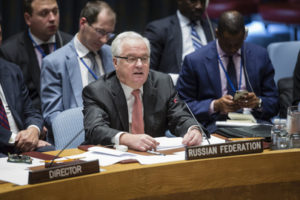
Vitaly I. Churkin, Permanent Representative of the Russian Federation to the UN, addresses the Security Council meeting on Syria. 25 September 2016 (UN Photo)
DB: And maybe we can end this way. If there isn’t a sane policy prevailing here, what are your worst concerns? I mean, this is the part of the world that everybody worries about, it takes us to that next level that we don’t even want to think about. So you want to talk about if we go the wrong way here, how this can unravel? What if there was a no-fly zone?
EB: If there was a no-fly zone, above all, it would not mean human rights and it would not mean peace for Syrians, and that’s the whole pretext of the no-fly zone. Because the U.S. administration, and their lackey corporate media, whitewash the crimes of the terrorists. They vilify the government. And nobody is saying the government is perfect. Because no government is perfect.
But the point is, this is a war on Syria, with terrorists from over 100 nations, waging their wicked and distorted version of Jihad in Syria, or just acting as paid and drugged out mercenaries. If the U.S. was to compose a no-fly zone, there are various allies of Syria that are not going to stand for it.
If people don’t actually care about human rights in Syria think about it from a U.S. perspective–you are actually putting yourself at war with Russia. Russia is an ally of Syria. It was invited by Syria. And it does have its own interest in Syria. And clearly it’s not going to stand for the U.S. destroying Syria as it did Libya.
DB: Alright, we’re going to leave it right there. Again, what’s that website if people want to follow your lectures?
EB: Yeah, it’s the handsoffsyriacoalition.net. And I just wanted to say if people really want an honest taste of what’s going on in Aleppo, I recommend taking a look at the Facebook page of Vanessa Beeley. She can also be found on 21st Century Wire. She was on the ground in Aleppo just this week. And she was interviewing these people who we are not hearing in our media.
Dennis J Bernstein is a host of “Flashpoints” on the Pacifica radio network and the author of Special Ed: Voices from a Hidden Classroom. You can access the audio archives at www.flashpoints.net.
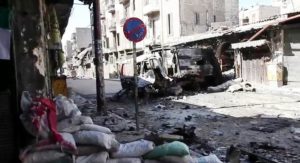




Geen opmerkingen:
Een reactie posten